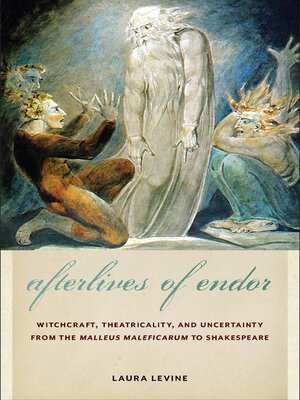Afterlives of Endor
ebook ∣ Witchcraft, Theatricality, and Uncertainty from the "Malleus Maleficarum" to Shakespeare
By Laura Levine

Sign up to save your library
With an OverDrive account, you can save your favorite libraries for at-a-glance information about availability. Find out more about OverDrive accounts.
Find this title in Libby, the library reading app by OverDrive.



Search for a digital library with this title
Title found at these libraries:
| Loading... |
Afterlives of Endor offers an analysis of the way early modern English literature addressed the period's anxieties about witchcraft and theatricality. What determined whether or not a demonologist imagined a trial as a spectacle? What underlying epistemological constraints governed such choices and what conceptions of witchcraft did these choices reveal? Pairing readings of demonological texts with canonical plays and poetry, Laura Levine examines such questions. Through analyses of manuals and pamphlets about the prosecution of witches—including Reginald Scot's skeptical The Discoverie of Witchcraft (1584), King James VI/I's Daemonologie (1597), and Jean Bodin's De la Demonomanie des Sorciers (1580)—Afterlives of Endor examines the way literary texts such as Shakespeare's The Winter's Tale and The Tempest, Spenser's The Faerie Queene, and Marlowe's Tragicall History of Doctor Faustus address anxieties about witchcraft, illusion, and theatricality. Afterlives of Endor attends to the rhetorical tactics, argumentative investments, and underlying tensions of demonological texts with the scrutiny ordinarily reserved for literary texts.






